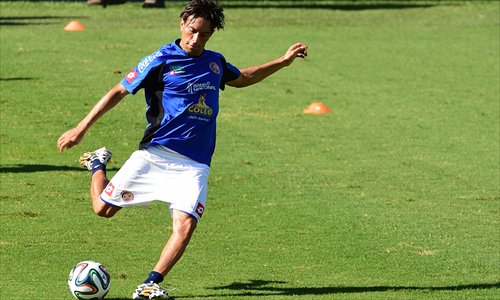The power of soccer to unite
Ongoing event demonstrates why sport is a forceful agent of peace

Costa Rica's midfielder Christian Bolanos prepares to kick a ball during a training session in Santos during the 2014 FIFA World Cup on Tuesday. Photo: AFP
My beloved Costa Rica, a little country of fewer than 5 million souls, has arguably captured the attention of billions by advancing into the quarterfinals of the 2014 FIFA World Cup. I will come together with my fellow Costa Ricans, supporters, and even rivals on Saturday to watch the next defining match for our country against Holland.
Our success so far in the tournament represents a remarkable achievement for my people. It also demonstrates the power of soccer to surpass borders and nationalities: to unite countries as equals on the field of play, and to unite fans from many more countries behind improbable victories and noble struggles, behind little-known countries or familiar champions who seek greatness side by side on the global stage. The World Cup demonstrates why sport is a powerful agent of peace, and how we can cherish and embrace our rivalries while also treating each other with respect.
The structure of this global tournament creates a unique kind of solidarity. Most fans have to choose countries, other than their own, to root for. Every four years, this process causes children all over the world to pore over maps and national flags, asking their parents questions that send those parents, in turn, to learn a few things about the world beyond their own borders. As the tournament proceeds and the field narrows, more of us root for nations we might never have imagined ourselves supporting. We learn the names and the faces of their children's heroes. We see the passionate expressions on their citizens' faces. We suffer and rejoice with fellow humans in far-off corners of the globe. Only at the World Cup can the arc of a ball toward a net lift so many people to their feet all over the world, people of every ethnicity and age and creed. Only at the World Cup does the globe unite in rapt attention to a single field, a single goal.
None of us, not even Nobel Peace laureates, are immune to the excitement and bravado, the national pride and nail-biting tension that the World Cup provokes. And, from the time when the tournament kicks off to the final whistle, everyone, everywhere wants to be part of the collective experience.
We face off with gusto, but the way in which we confront each other provides a valuable lesson, if we choose to learn it. For at the World Cup, we play out our rivalries not on the battlefield, but on the soccer field. A game is not a peace negotiation, but it does feature the same components of shared rules and mutual respect. Soccer may seem like war at times, but in the end, the competitors walk away unharmed. They shake hands and exchange jerseys, ready to play another day.
Soccer, and sport in general, represents an opportunity to build a better version of a world too often threatened by irrationality, intolerance and violence. Like any opportunity, it only counts if we take advantage of it. As spectators and parents, educators and leaders, we must train our eyes to see not only spectacular goals, but also acts of sportsmanship, to point out to each other, and to our children, not only athletic prowess, but also solidarity and diversity. We must use this platform to unite rather than to divide. And we must carry these lessons of peace far beyond the final whistle, in the hopes that someday, the world's game will no longer be a rare shooting star in a dark night of conflict, but part of the dawn of a more rational age.
The author won the Nobel Peace Prize in 1987 and served as the president of Costa Rica from 1986 to 1990 and from 2006 to 2010. Costa Rica and the People's Republic of China established diplomatic relations under his second administration (2007).